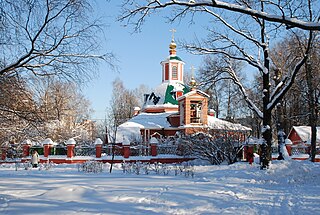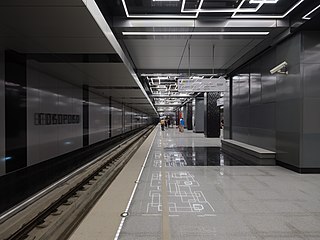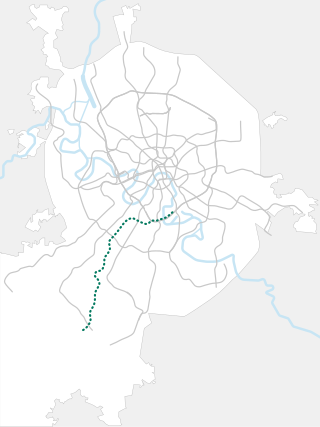
Frunzenskaya is a Metro station on the Sokolnicheskaya Line in Moscow, Russia. The station was opened on 1 May 1957 as the first stage of the extension of the Frunzenskiy radius. As the radius follows the bend of the Moskva river, the whole segment had to be built very deep.

Dinamo is a Moscow Metro station on the Zamoskvoretskaya line. It opened on 11 September 1938 as part of the second stage of the system. It was named for the former Dinamo Stadium, the home stadium of FC Dynamo Moscow. Passengers may transfer directly to the Bolshaya Koltsevaya line via Petrovsky Park station.

Kashirskaya is a former (future) cross-platform station complex on the Moscow Metro. It was opened on 11 August 1969 as part of the Kakhovsky radius extension, and from 1984 was an interchange between the Kakhovskaya and the Orekhovskaya branches of the Zamoskvoretskaya line. Since 2022 it will be officially classed as three stations after the Bolshaya Koltsevaya line's separation, and also will be the terminus of it.

The Lyublinsko–Dmitrovskaya line is a line of the Moscow Metro. It was known as "Lyublinskaya line" before 2007. First opened in 1995 as a semi-chordial radius it is at present in process of being extended through the centre and northwards. At present the line has 34 kilometres of track and 23 stations.

Obruchevsky District is an administrative district (raion), one of the twelve in South-Western Administrative Okrug of the federal city of Moscow, Russia. As of the 2010 Census, the total population of the district was 78,619.
Ksenia Dzhalaganiya is a Russian group rhythmic gymnast, who is now the founder and director of Dubai Youth Olympic school of rhythmic gymnastics in the United Arab Emirates.

Govorovo is a station on the Kalininsko-Solntsevskaya Line of the Moscow Metro. Previously planned to open in 2017, it opened on August 30, 2018, as part of line's "Ramenki" - "Rasskazovka" extension.

Panfilovskaya is a station on the Moscow Central Circle of the Moscow Metro. The station opened in November 2016 and was the 31st and final station to open on the line.

Botanichesky Sad is a station on the Moscow Central Circle of the Moscow Metro. Construction started on the station in October 2014 and the station opened in September 2016.

Koptevo is a station on the Moscow Central Circle of the Moscow Metro that opened in November 2016.

Alexey G. Komissarov – Russian entrepreneur, Acting Rector of the Russian Presidential Academy of National Economy and Public Administration (RANEPA), the Director of the Graduate School of Public Administration at the RANEPA, and ex-Minister of the Government of Moscow.

Belomorskaya is a station on the Zamoskvoretskaya line of the Moscow Metro. It was opened on 20 December 2018. It is located between Rechnoy Vokzal (south) and Khovrino (north). Belomorskaya was completed while the stretch between Rechnoy Vokzal and Khovrino was already in operation.

The Troitskaya line is a under construction line of the Moscow Metro that will initially extend to the settlement of Kommunarka in the Novomoskovsky Administrative Okrug, or New Moscow from Novatorskaya station. Future expansion plans will extend the line to the town of Troitsk. The city is constructing the line with a planned opening in 2023-2024.

Sergey Sobyanin is serving as the third Mayor of Moscow since 21 October 2010.

The Kazan Gymnastics Center, is an indoor sports arena in Kazan, Russia. Built for 2013 Summer Universiade, it was inaugurated on 14 November 2012. Currently it is used for training athletes from Kazan Youth Sports Schools and Volga Region State Academy of Physical Culture, Sport and Tourism. There are also daily classes conducted by Olympic champion Yulia Barsukova

Okruzhnaya is a railway station on the Savyolovsky suburban railway line originating at Moscow Savolovsky railway station. It opened in 1911, and was reconstructed in 2018, to allow better interchange with the Moscow Central Circle line.
The Russian Junior Rhythmic Gymnastics Championships are organized annually by the Russian Rhythmic Gymnastics Federation.

The Round Houses in Moscow are nine-floors residential buildings built circularly, in Western Moscow in 1970, according to a project by architect Yevgeny Stamo and engineer Aleksandr Markelov. They are located at 55°43′21″N37°30′49″E and 55°42′26″N37°28′14″E

City Clinical Hospital No. 40 is a major hospital serving Moscow and the region surrounding it.

Capital Group is a Russian development company founded in 1991, by Vladislav Doronin. Its area of activity is the integrated development of real estate projects. Capital Group took the first place in the Forbes rating of elite housing developers in Russia.


















